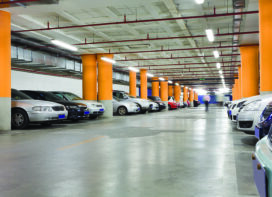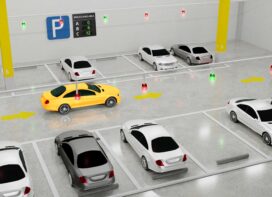 The panel consisting of V Ramesh, CEO, Varam Parking Pvt Ltd; Nagendra Reddy V, CEO & Founder, VTRAC Worldwide; Udaya Bhaskar Rao Abburu, CEO & Managing Director, iRam Technologies; Arvind Mayar, CEO, Secure Parking Solutions Pvt Ltd and Amit Haware, CEO & JMD, Haware Properties discussed about efficient parking technologies and innovations
The panel consisting of V Ramesh, CEO, Varam Parking Pvt Ltd; Nagendra Reddy V, CEO & Founder, VTRAC Worldwide; Udaya Bhaskar Rao Abburu, CEO & Managing Director, iRam Technologies; Arvind Mayar, CEO, Secure Parking Solutions Pvt Ltd and Amit Haware, CEO & JMD, Haware Properties discussed about efficient parking technologies and innovations
When it comes to parking, Indians display a strong preference for parking on the streets over authorized parking spaces. Given its convenient and free in nature, it’s not surprising that most commuters prefer on-street parking, a fact that is well-reflected in occupancy data. Despite being an organized and safe parking alternative, off-street parking has lagged behind due to the exorbitant parking fees, resulting in low occupancy levels.
Parking on Indian streets is haphazard with commuters having scant regard for space and traffic congestion. Many surfaces and multi-level parking lots remain under-used even as the streets burst at the seams with chaos and traffic.
According to Udaya Bhaskar Rao Abburu, who led the discussion, parking issues need to be tackled at different levels. First, for residential off-street parking, no car should be registered until its owner can demonstrate proof of suitable parking slot availability within his premises. Municipal Corporations should incentivize private developers and owners to acquire space for building underground and over-ground car parks. Once multi-level car parks are developed, their O&M can be given out to private parties.
Rao explained, “Today, parking is either free, or in the control of licensed unprofessional tollcollectors who have flat rates, because there is no clear policy for regulating and charging for the use of street parking space. Low parking fees also have adverse urban effects: over-utilization of energy, violation of tenets of transit-oriented development and degradation of the environment.”
At a micro-level, parking metres should be installed along street roads at all designated car-parking areas. These should be set to charge demand-based flexible rates on an hourly basis. So, in peak hours, the rates should be substantially higher than in lean hours. Stiff penal provisions have to be in force to discourage illegal on-street parking. Further, on-street parking should be more expensive than off-street parking. This is necessary to deter and discourage on-street parking and also to incentivize off-street parking and to promote the viability of privately managed parking.
Need for Efficient Parking Technology
 To make car parks more efficient and effective, there’s a need to mandate electronic radio-frequency identification (RFID)-based tolling and boomlifting systems and integrate car-parking with highwaytolling so that the same tag works for both—and ideally, across the country.
To make car parks more efficient and effective, there’s a need to mandate electronic radio-frequency identification (RFID)-based tolling and boomlifting systems and integrate car-parking with highwaytolling so that the same tag works for both—and ideally, across the country.
V Ramesh pointed out that most of the off street parking attempted by different Indian cities are failing. The ‘Pay-and- Park’ parking garages across India are typically woefully under-used, while chaos continues in the nearby streets where there is practically no management or enforcement. It is a familiar story around the world, and the only way to get better value from offstreet parking is to manage the on-street parking.
 TrafficInfraTech Magazine Linking People Places & Progress
TrafficInfraTech Magazine Linking People Places & Progress


